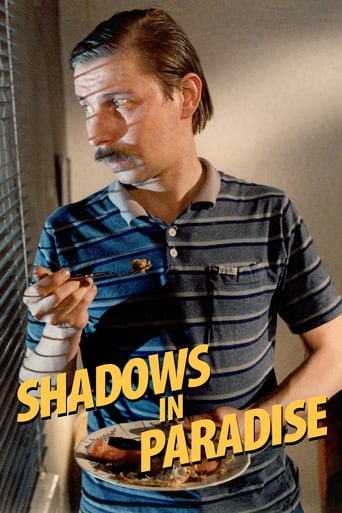filmalamosa
A great look at Helsinki you'll never see in any travel brochure. I went into this movie blind--and found it fun in removing me from the here and now. The tone is noirish and deadpan---the actors perfect for the roles. All of it was sort of believable in a humorous way which is key to this movie.The movie was made in 1986 almost 30 years ago so it involves some time travel as well.I recommend it is the sort of thing I like although I would not probably rush to watch it again...7---RECOMMEND
markwood272
Some random observations: 1. Kaurismaki's "paradise" is grimy city streets, garbage, landfills, jails, flophouses, shabby apartments. Two kinds of people inhabit this Eden: either the few, the snooty, the well off – or the subverbal, poorly educated quasi-lumpen stumbling about among the aforementioned sites. The settings, both exterior and interior, belong more to the England of "The L Shaped Room" or "Billy Liar" than to the Scandinavia of travel agency brochures.2. Kaurismaki delivers virtuoso satire founded upon the stereotypical shy, wordless Finn. But he offers more by pushing beyond stereotype to display a deep familiarity with the kind of people he shows on the screen. An American director similarly so in tune with his people might be Kevin Smith. A possible British counterpart? Maybe Ken Loach.3. "Shadows in Paradise" is also a testament to Kaurismaki's confidence in the cinematic medium itself, in its power to tell stories using sight and sound without principal reliance on the material of theater or literature – words. We are accustomed to the many films about how XX meets XY, where the characters express feelings, establish plot, indeed, do just about everything through words. Sometimes we even get entire orations, regardless of a film's "realistic" intent. Dialogue rules everything from the quippy screenplays of Nora Ephron or Preston Sturges to the tangly Gallic word-webs of Eric Rohmer. The similarities between Ernest Borgnine and Betsy Blair in "Marty" and Matti Pellonpaa and Kati Outinen in "Shadows in Paradise" end with "Marty's" theatrical, dialogue-soaked provenance. It would be hard to transfer this film of Kaurismaki to page or stage. The story would weaken and likely die in print or any exclusively verbal form.4. For his comedy Kaurismaki employs a delay-deadpan technique, something familiar to anyone who has seen the "punishment" sequences in Laurel and Hardy's "Tit for Tat' (1935) or who remembers the standup routines of Jackie Vernon in the 60's. Kaurismaki's comedies – and "Shadows in Paradise" is a good example – prove the technique still achieves the desired result: laughs. And like Jackie Vernon or Laurel and Hardy, Kaurismaki makes his words just another ingredient in the comedy. They are well chosen and sometimes hilarious but enjoy no special preference.5. The movie screened the other night on TCM with the host's caution that this is an unusual sort of romantic comedy – but why the caution? And why the need for any "category" in the first place? To call this a "romantic comedy" and then warn people about its "quirky" or "offbeat"nature does it a double disservice. The warning for possible category transgression either implies that the film is deficient for disregarding certain "rules", or cautions the audience that it will be disappointed, since the movie does things it probably won't accept. But comedy, like so many things in life generally, thrives on surprise. In "Shadows in Paradise", Kaurismaki presents modern, free, prosperous Finland as a bizarre and rather dismal place which he proceeds to mine for laughter and the occasional tear. Whatever a television host labels it, the movie manages to be funny, entertaining – and accessible.6. A Kaurismaki movie has a distinctive "feel", as strongly trademarked as the comedies of Lubitsch or Sennett.
Sindre Kaspersen
Finnish writer and director Aki Kaurismaki's third feature film is the first in his trilogy about the Finnish working-class which was succeeded by "Ariel" (1988) and "The Match Factory Girl" (1990). It tells the story of middle-aged garbage driver Nikander who is approached one day at work by his colleague who has decided that he refuses to end his days behind the steering wheel. Nikander's friend presents him with an idea about starting an own company and wants him as his partner. Nikander likes the idea, but when his friend dies from a heart attack the following day, Nikander loses his faith. Nikander continues his days with driving garbage and attending an English course until the day he spots cashier lady IIona. Nikander invites her out on a date, but she loses interest in him when he brings her along to play bingo. Nikander proceeds with his ritualistic life, but the day IIona is fired from her job he receives a call which reimburses his faith. IIona wants to go to Helsinki and together they embark on a trip towards brighter prospects.Finnish director Mika Kaurismaki's little brother Aki Kaurismäki, one of Europe's greatest and most original filmmakers, has created a distinctly innovating and minimalistic style of filmmaking with films such as "I Hired A Contract Killer" (1990), "Drifting Clouds" (1996) and "The Man Without A Past" (2002). His low-keyed, stringently structured and bittersweet films are characterized by few characters, minimal dialog, dry and sarcastic humor and a language which without exception is standard Finnish. The genius with Aki Kaurismäki is that through his remarkable stories he manages to clarify the precious value of humor. This Finnish production which was produced by Aki Kaurismäki's older brother Mika Kaurismäki is a subtle and simple story about two love seeking human beings who due to their modest nature is distanced from one another and who creates unnecessary obstacles for one another. They both have hopes and dreams of a greater and better life, but their ideals are repeatedly challenged by faith's unpredictable intervention.The directing, the cinematography, the film editing, the narrative, the dialog, the atmosphere, the pace and the very realistic milieu depictions is in accordance with Aki Kaurismäki's usual style in this acute comedy drama about everyday life, interpersonal relations, identity, love and the Finnish working-class during the late 1980s. The acting performances by the director's frequent collaborators Kati Outinen and Matti Pellonpää (1951-1995) is marvellous and their characters' colorful personalities creates a fine contrast to the films underlying melancholy. This character-driven and dialog-driven joy spreader which gained the award for Best Film at the Jussi Awards in 1987 presents the viewers to an incomparable cinematic universe and it is an unconventional and romantic fable with a great heart and a poetry of faith that is drifting through the gray toned shadows which rests above Aki Kaurismäki's rare paradise.
madsagittarian
(possible spoiler in third-to-last paragraph, if taken in context)Before the late great film critic Jay Scott left this planet in the early 1990's, the "Globe and Mail" critic also hosted a weekly television program, "Film International", which provided an invaluable resource of foreign films for those in Ontario who wouldn't have access to them otherwise. One of the crowning events of this series was the month-long collection of Aki Kaurismaki films (and one by his brother, Mika). Then as now, Kaurismakilargely remains a well-kept secret among the film festival circuit. His delightfully deadpan works seldom get picked up for distribution in North America, which is a tragedy. He is one of the most original and interesting international filmmakers of the past quarter century.SHADOWS IN PARADISE was the first Kaurismaki film I ever saw, and of the eight or so I have screened since, this remains one of his finest works, and a valuable introduction to his world. It is a shame that this is still not available on video. Like his contemporary and friend, Jim Jarmusch, Kaurismaki makes films about anhedonic expressionless underdogs who mostly sit around and brood. (Is it any accident that this film is similarily titled to Jarmusch's STRANGER THAN PARADISE?) Both men take the simple set-up of Warhol filmmaking to another level. Their films are full of unobtrusive single-take scenes (or at least with minimal editing), moving portraits of lonely disenchanted people, very addictive viewing because you never know what happens next. Like Jarmusch or Chantal Akerman, Kaurismaki is a master of minimalist filmmaking.But what separates his work from others is his expert use of offscreen imagery (a kiss is represented by a hand holding a cigarette), the surprising spontaneity of his miserable characters (because the garbageman finds a record at the dump, he suddenly purchases a brand new stereo system in order to listen to it!), and a tacked-on, deliberately absurd happy ending (which impossibly gets his people out of the worst situations) which is meant to be his sly comment on the Hollywood films he despises.Like any great film auteur such as Altman, Fellini, Preston Surges, or even Almodovar, Kaurismaki's films are peopled with unforgettable, unique faces via his own stock company. Matti Pellonpaa is perfect as the garbage man (his slicked-back hair, big glasses and droopy moustache make him the quintessential oddball underdog), as is the blank-faced Kati Outinen, the recently fired supermarket cashier who finds romance with this man. Her flat, pale visage is like death warmed over-- her only cinematic equivalent is Falconetti in LA PASSION DE JEANNE D'ARC.SHADOWS IN PARADISE is the first of Kaurismaki's "loser" trilogy (followed by ARIEL and THE MATCH FACTORY GIRL). It is a hilariously deadpan, wonderfully dark, yet strangely sweet, and compulsive viewing experience. It is a crime that this movie has not been picked up by a video label. However you can, see this film!





